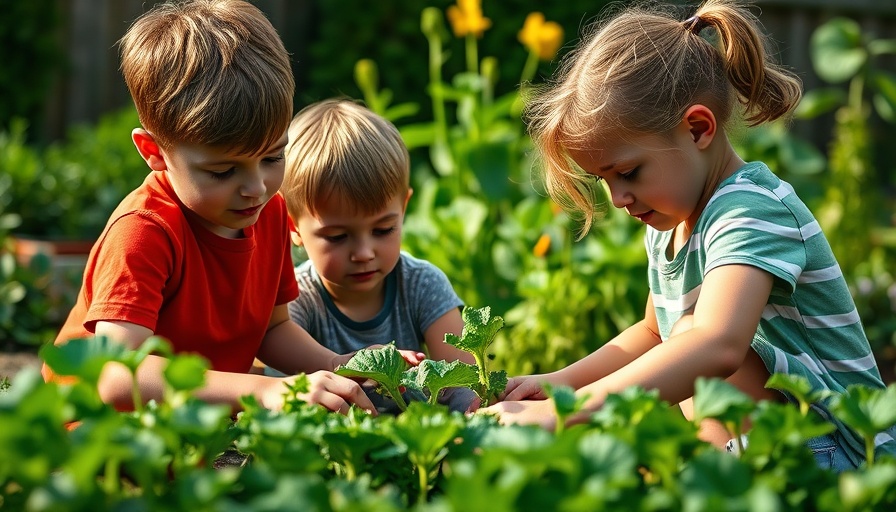
Gardening with Kids: A Gateway to Life-Long Skills
In a world where screens often take precedence in children's lives, gardening emerges as an enriching antidote, offering multifaceted benefits that extend far beyond mere fun. Gardening with children doesn't just inspire wonder in tiny hands; it cultivates essential life skills and a deeper appreciation for the environment. Here's a closer look at why engaging kids in gardening is so beneficial.
Engaging the Senses: A Multi-Sensory Experience
Gardening is a rich sensory playground for children. The tactile experience of touching soil, seeds, and leaves; the visual delight of vibrant flowers and lush greens; and the aromatic scents of herbs provide an interactive way for kids to connect with the natural world. This hands-on exploration encourages curiosity and wonder about where our food comes from. Furthermore, engaging all five senses reinforces learning, as children see the immediate effects of their nurturing efforts with each stage of plant growth.
Building Responsibility Through Daily Care
When children take on the role of caretakers in the garden, they learn about responsibility in a tangible way. Tending to plants requires consistency; they need watering, weeding, and care. Children quickly recognize that each day presents a new opportunity to observe their plants' progress. This cycle fosters a strong sense of accountability, and conversations naturally develop around environmental stewardship, chemical impacts, and sustainable practices.
Boosting Motor Skills and Focus
Gardening tasks require fine motor skills. From digging to planting seeds, every action facilitates strength and coordination, particularly in the hands and arms. As children engage in these activities, they enhance their ability to concentrate, which can translate into improved focus in academic settings. Furthermore, through repeating various tasks, such as watering and harvesting, kids develop comfort in their physical capabilities, which augments their confidence and self-esteem.
Encouraging Healthy Eating Habits
Getting kids to enjoy fruits and vegetables can often feel like an uphill battle. However, studies show that children who participate in growing their own food are far more likely to prefer eating it. By involving kids in the entire gardening process—from planting seeds to harvesting crops—parents can cultivate not only a sense of achievement but also a lasting interest in nutritious foods. This connection between gardening and healthy eating has the potential to inspire children to become the next generation's culinary innovators, echoing the philosophies of renowned chefs like Jamie Oliver and Gordon Ramsay.
Fostering Interest in STEM Education
Gardening is an amazing blend of biology, ecology, and chemistry, paving the way for children to engage with STEM (Science, Technology, Engineering, and Mathematics) principles in an accessible manner. From understanding the life cycle of plants to learning about ecosystems, children absorb complex scientific ideas while having fun. Such exposure not only fosters academic interests but also cultivates critical thinking and problem-solving skills as they work through challenges such as pest management or soil health.
Facing Modern Challenges: Building Community Through Gardening
Urbanization has made green spaces crucial for community connectivity. Community gardens not only provide space for collective gardening efforts but also create a sense of belonging among participants. Convincing kids to get involved in community gardening allows them to interact with peers, learn cooperation, and foster friendships while cultivating their green thumbs. The drive towards urban gardening reflects a commitment to sustainable agriculture and community health, encouraging creative new spaces such as rooftop and vertical gardens, which turn underutilized areas into productive landscapes.
Conclusion: Empowering Future Generations
Encouraging kids to engage with gardening offers a multitude of benefits that impact their physical, emotional, and intellectual development. From instilling a sense of responsibility to promoting a healthy lifestyle, the positive effects of gardening with children cannot be overstated. As more families embrace these practices, they nurture a generation that values both health and sustainability.
If you haven’t already, consider starting a small garden with your kids—it's a great way to bond and share in the wonder of nature. Explore urban farming or join local community gardens to enrich your family’s experiences and connection with the environment. What's stopping you?
 Add Row
Add Row  Add
Add 




Write A Comment